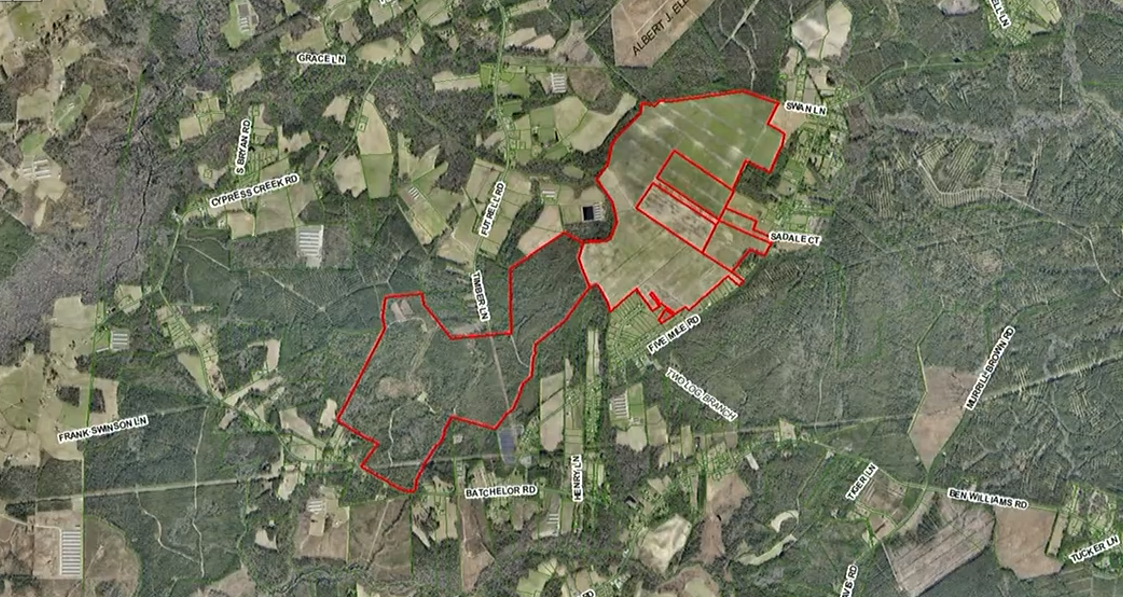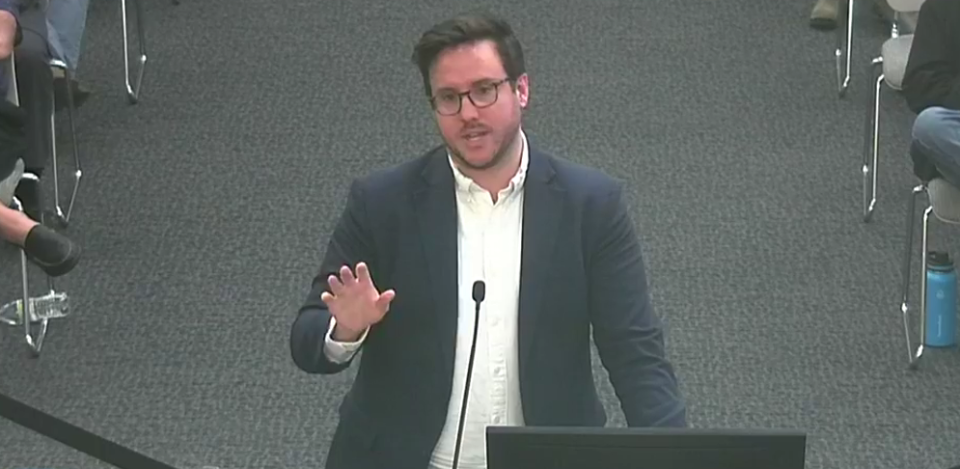A major solar farm could be coming to western Onslow County. Here's what we know.

A major solar farm could be coming to the western part of Onslow County, but concerns about radiation, property values and more are many.
On behalf of the property owners, John Eskew with Cypress Creek Renewables has submitted an application to rezone over 1,009 acres of parcels from rural agriculture and residential 10 to conditional zoning rural agriculture in order to construct a solar farm, according to Onslow County Planner Carter Metcalf at Monday's Board of Commissioners meeting.
The parcels are located on the west side of Five Mile Road and the north side of Batchelor Road in the White Oak Township.
Metcalf said the proposed rezoning may be considered taking a step toward renewable energy use and energy independence. However, it would also impact one of the significant natural heritage areas and the decommissioning may result in significant impacts to the county's landfill sites.
The solar farm has about a 30-year life span and Metcalf said the Onslow County planning board unanimously recommended approval of the rezoning on Dec. 1.
"Solar occupies less than a percent of all available agricultural land in North Carolina and if you include timber land, that figure gets even smaller," said Senior Developer with Cypress Creek Renewables Harrison Cole in the meeting. "The timber parcel that you see on the site plan, that'll only be used for an electrical easement and then an occupying maintenance road as well. We're not going to be doing any tree clearing of that area. If there is, it'll be very minimal just to make sure our maintenance vehicles can get up and down that parcel."
Cole explained that Cypress Creek is based out of Durham and has been in North Carolina since 2014, developing solar farms across the state. He added they've even developed smaller solar farm sites in Onslow County already.
The proposed solar farm would take up about 500 acres and a vegetative buffer would be included to help reduce the visual for area homeowners. Cole said the plan is to sell power to Duke Energy, though they are still a couple of years out from construction.
State-certified general appraiser Nicholas Kirkland told the board it is his professional opinion that the proposed use will not only be harmonious in its location but will also not impact the adjoining property values.
Despite this assurance, several local residents have concerns.
"We have a great concern about the impact solar panels will have on our property," said resident Nelson Valentin during the rezoning's public hearing. "We know solar panels are here, they are not going away. However, consideration should be given to the impact it will have to those that live and have properties around the solar panel farm."
Valentin, who owns 60 acres of land adjacent to the proposed solar farm, said he has concerns about electromagnetic interference, especially in an area that already has problems with reception. Additionally, Valentin said he's worried about the health risks of electromagnetic waves. He said he already has health issues to worry about.
Specifically, Valentin has an implant on his back that uses electroshocks. He said he's worried about interference with the implant. Valentin also brought up the concern that toxic materials could cause runoff onto his land, and the worry that property values could be lowered due to the close proximity to the solar farm.
"My land, our land, gives me a sense of peace, where I can go out and enjoy the land as I wish," Valentin said. "I suffer from PTSD and anxiety. My land provides me with a therapy that is much needed from time to time."
Another concerned resident said he's worried about the amount of coal needed to produce these panels and the burning of minerals in the atmosphere.
"It says renewable energy, but these panels only have a lifespan of so many years, 30 years, and then we've got to start the process over again," the resident told the board.
Local resident Randy Raynor spoke from the perspective of a taxpayer, saying it costs more to generate electricity with solar and wind than it does natural gas and coal. He said the taxpayer pays for it when he gets his electric bill, and then again when the government subsidizes.
Eskew spoke to the board to try and alleviate some of these concerns.
He said radiation on-site is a very common concern that the public often has. He ensured those present that much of the equipment on-site does not produce electromagnetic fields, and the inverter equipment centrally located along the facility produces about the equivalent of what you'd expect standing by a TV or microwave. Eskew added there is also no EMF radiation that leaches outside of the fencing itself, harming any public health.
Regarding chemical leaching from the modules themselves, anytime a module is damaged on-site, Eskew said it's encased in glass and aluminum.
"If they are damaged, there is some potential," Eskew said. "However, anytime we do identify a damaged module itself, it is isolated, removed from the racking itself and stored properly based off federal and local guidelines to prevent any kind of potential leaching, which is very likely never to happen."

Some residents all for the idea
Not all residents have concerns, though.
Nick Hannon, who sits on the HOA board for the Cherry Grove community, told the board that when the proposed solar farm was initially announced, the community had concerns, as the vast majority of their homes border the farmland.
However, Hannon said their stance has drastically changed.
"Agriculture has always been an inherent part of Onslow County," Hannon said. "It is a dying industry and that's unarguable. Going forward, unfortunately, the position these property owners are in is transitioning the use of this land. The development of this is going to aid this family for the next 40 years and their generations to come, and eventually, hopefully, when the solar panels do come out, it will be turned back into agriculture and continue on through their generations of family for that usage."
Hannon added the development team has worked extremely well with the community and every concern has been gone through in meetings. He said further steps have even been taken such as moving the inverters even further away from the properties and increasing the buffer to protect the view homeowners moved to the area for in the first place.
Jay Jacobson, a resident of the Cherry Grove subdivision, told the board he's been very impressed with the way the company does business.
"I think it'll be an asset to the community because it's cutting out crop duster," Jacobson said. "At times, the air gets thick with pesticides and stuff like that, so that's all going to be eliminated, pretty much, I should say. It'll create a better environment for the kids in the community and the people."
The Board of Commissioners, though, has their own concerns.
The board's concerns, next steps
Commissioner Paul Buchanan said in the meeting that his major concern is about where the solar panels would be disposed of at the end of their life span, as he's been told they can't go into the landfill.
Commissioner Royce Bennett voiced the same, asking how the county can ensure the area gets cleaned up should the solar farm go bust in a few years.
However, Cole said the panels can actually go into the landfills. Cypress Creek Renewables would also try to recycle as much as they can because there is salvage value.
"We don't plan to put everything into landfills," Cole said. "We're going to try and recycle to get money out of it for the salvage value, first and foremost. Anything that can't be recycled or traded in, will be put to landfills. This isn't just necessarily Onslow County; it can go to surrounding counties as well."
Assistant County Manager Ben Warren said Onslow County's existing landfill has about 25 years of capacity remaining, which is based off the materials it currently receives.
After those 25 years, they don't yet know what will happen.
County Attorney Brett DeSelms recommended the board hold off on making a final decision on the solar farm rezoning until their March 6 meeting, that way the county has time to memorialize the conditions the board would like to have and then the property owners could sign off, which is required by law.
"I'm all about solar power, so to speak, I'm all about technology and trying to conserve money or energy or whatever it might be, but I do have a lot of questions in my head," said Board Vice Chairman Robin Knapp. "I've been reading about it, and I am concerned about the radiation. I know you've assured me as an expert there's very minimal leakage."
Knapp said he also doesn't understand how the land go back to farmland in the future, because how can they guarantee there hasn't been contamination to the soil, trees, etc.
"I'm not sold completely on what we're talking about because we don't know for sure," Commissioner Walter Scott said. "Commissioner Buchanan, the rest of us, we have looked at this, we have read what y'all have given us and I'm extremely concerned about the future cost and what it's going to do to our landfill and our surrounding landfills."
The county will take the next month to work with the applicant in memorializing the board's conditions and creating a final document that will be up for the board's approval on March 6.
Reporter Morgan Starling can be reached at mstarling@jdnews.com.
This article originally appeared on The Daily News: A major solar farm could be coming to western Onslow County. Here's what we know.

